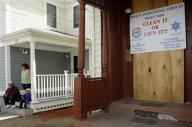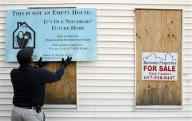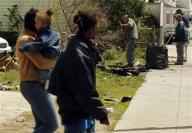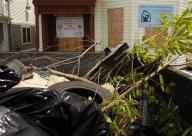US squats are on the rise
Mon May 19, 2008 2:47am EDT
BROCKTON, Massachusetts (Reuters) - They enter through a broken first-floor window each night to sleep on a moldy bed in the abandoned four-family house at 827 Main Street, part of a new generation of squatters emboldened by America's housing foreclosure crisis.
"For squatters, foreclosed homes like this are like a camp-ground with free camping," says real-estate broker Marc Charney, a foreclosure specialist, as he enters the home in Brockton, Massachusetts, and shines a flash-light at a mattress where homeless people have been sleeping each night.
Squatting is on the rise across the United States as foreclosures surge, eviction notices mount and homes go unsold for months, complicating the worst U.S. housing slump in a quarter century and forcing real-estate brokers to enlist the help of law enforcement and courts to sell empty houses.
In some regions, squatting is taking on new twists to include real-estate scams in which thieves "rent out" abandoned homes they don't own. Others involve "professional squatters" who move from one abandoned home to another posing as tenants who seek cash from banks as a condition to leave the premises -- a process known by real-estate brokers as "cash for key."
"There are people who move in and know exactly who to contact and say 'If you want this house, why don't you come out here and offer me cash,'" said Detective Erin Camphouse of the Los Angeles Police Department's Real Estate Fraud Unit.
"It's just cheaper for the banks to do that rather than going into the courts," she said. "The squatters are getting sophisticated and turning it on these banks who own the properties."
She cited another case in which a Los Angeles man recently "leased" three abandoned homes to unsuspecting renters through Craig's List, the online classified advertising company. The renters paid first and last month deposits, moved their belongings in and lived in the homes for several months.
"In one case, there were loose ends of rehab on the house that needed to be done and the crook wasn't coming through or wasn't completing it. So they offered to do it instead of paying rent. They put down tiles and carpet and all that kind of stuff. And it wasn't until the sheriff put the lockout notice on the door that they realized something was wrong."
New Jersey real-estate broker Bill Flagg is in a different type of legal tussle with occupants of a foreclosed home who refuse to leave in Plainfield, a city of 47,829 people.
"We know the people are squatters. But we have had the cops there. We had the electricity shut off and the cops wouldn't put the people out. We have to go to court to get them out. They claim to be tenants," Flagg said.
Such cases of squatters posing as tenants are on the rise, said Bill Collins, president of the New Jersey chapter of the National Association of Real Estate Brokers.
"These people claim that they have a lease but they can't find it. And the property owner has been removed from the property or been foreclosed on, so they have no interest in confirming if this person is a valid tenant," he said.
"So now you have squatters who are assuming that they are tenants and have rights to some degree to stay in the property until we can go through the court system to get them out.
"And they have caught wind that what most of these banks are doing is giving cash for keys, so cash for eviction -- anywhere from $1,000 to $1,500. So here you have a squatter who goes into a property, takes up residence, tells you that he is a tenant, goes to court and says that he is a tenant.
"Who can prove otherwise?"
California real-estate broker Steve Smallson said he finds about three squatting cases a month, compared to none last year, in his region of Woodland Hills, a middle-class district of Los Angeles. That includes a case in April involving a foreclosed home worth $1 million where police were called after neighbors reported squatters filming pornography in the house.
The problem is compounded in some states by the weakening economy and its effects on America's homeless, who number about 744,000 each night according to the National Alliance to End Homelessness, an advocacy organization in Washington.
"The rise of squatting is a natural consequence of these properties sitting there empty caused by the whole foreclosure crisis," said Steve Berg, a vice president at the alliance.
(Reporting by Jason Szep; Editing by Eddie Evans)




